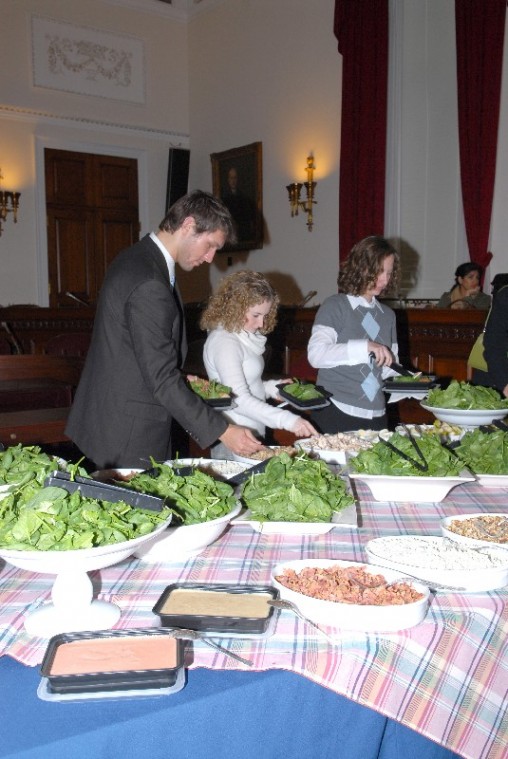
Consumers need to know the E. coli problem is solved. Industry
turns to bumper stickers
The E-coli outbreak from tainted spinach that left 200 sick and
three dead earlier this year has left a bad taste in the mouths of
many consumers. Now the spinach industry
– and the leafy greens segment in general – are beginning
marketing efforts to regain its pre-outbreak market standing.
Consumers need to know the E. coli problem is solved. Industry turns to bumper stickers
The E-coli outbreak from tainted spinach that left 200 sick and three dead earlier this year has left a bad taste in the mouths of many consumers. Now the spinach industry – and the leafy greens segment in general – are beginning marketing efforts to regain its pre-outbreak market standing.
The E-coli is believed to have come from wild pigs, but nothing can be conclusively released until the federal Centers for Disease Control and the FBI have concluded their investigations.
Spinach is a major crop in San Benito County. Earthbound Farms, a major producer of spinach, has its headquarters in San Juan Juan Bautista.
One local group, the Central Coast Young Farmers and Ranchers, is hoping that an “I love spinach” bumper sticker campaign will help to restore consumer confidence.
Young Farmers and Ranchers has been selling the stickers for $2, since the beginning of the month. All of the proceeds from the sales go toward support of promotional efforts to restore consumer confidence in Salinas Valley leafy greens.
Other products – Tylenol and Odwalla are two high-profile cases – have both had bad publicity to overcome, but with the right marketing direction consumer confidence can be restored.
Odwalla, a natural juice company located just north of Santa Cruz in Davenport, was similarly affected by an E-coli outbreak in 1996. The bacteria, which was the same strain that hit the spinach supply, caused one death and 66 illnesses before all was said and done. Spokespersons for Odwalla did not return phone calls.
Nanci Williams, principal with Orloff/Williams Advertising and Public Relations, in San Jose, was involved with crisis management when Tylenol was the victim of industrial terrorism in 1982 when still-unknown murderers laced capsules with cyanide, killing seven people in the Chicago area.
Williams believes that an industry can definitely recover from setbacks like this, but how quickly depends on how the situation is handled. Tylenol is a textbook example of how to do it right.
“With the Tylenol crisis, [Johnson & Johnson] immediately came forward and took responsibility. Even though it was clearly an act of industrial terrorism, they didn’t hesitate to pull packages off the shelves and release new packaging with tamper-proof caps. Their market share went up significantly, because it made consumers feel safe,” Williams said.
On the opposite side of the coin, she pointed to the PR debacle surrounding the Exxon Valdez – the tanker that in 1989 ran aground and dumped an estimated 30 million gallons of crude oil into the Prince William Sound in Alaska, causing catastrophic environmental damage. Williams said that the lawyers had the ear of the chief executive officer of the company at the time, Lawrence Rawls, and consequently for the first several weeks of the incident, Rawls refused to comment. The public definitely took notice.
“Marketing won’t make a difference all by itself. If you don’t convince consumers that this problem won’t occur again it’s the same as reminding people that spinach had problem in the first place,” Williams said. “What the industry should be doing is showing people how they have addressed the problem and that it won’t happen again. They need to form an association and get the word out there.”
However, Williams pointed out that even if an industry does nothing eventually the market would return. It’s just how long it takes to get back to where it was.
April England came up with the idea for the spinach bumper stickers in October when she was at the Young Farmers and Ranchers annual Harvest Dance. Organizers served a spinach salad and she and other attendees were standing around and talking as they ate. It was there that she had the idea for the stickers.
Since they started printed almost their entire stock of 5,000 stickers have been sold and the group is considering ordering a second batch.
The stickers have shipped as far as Maine Pennsylvania and Texas, but are available locally at the Farm Bureau office in downtown Hollister.
Paul Hain, president of the San Benito County Farm Bureau said he has one of the stickers on the back of his truck and thinks the idea is a step in the right direction.
“I think it’s a good promotional tool for showing support of an industry that has taken a hit and it’s for a good cause.”
Patrick O’Donnell can be reached at po*******@**********ws.com.








